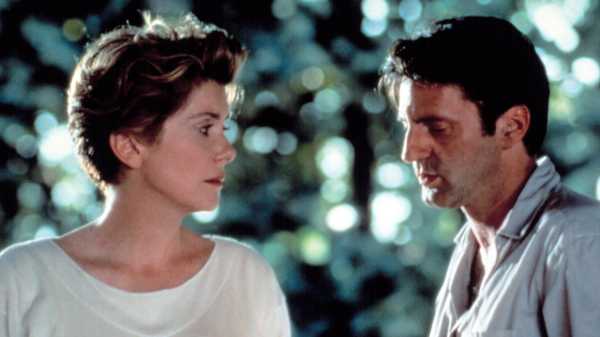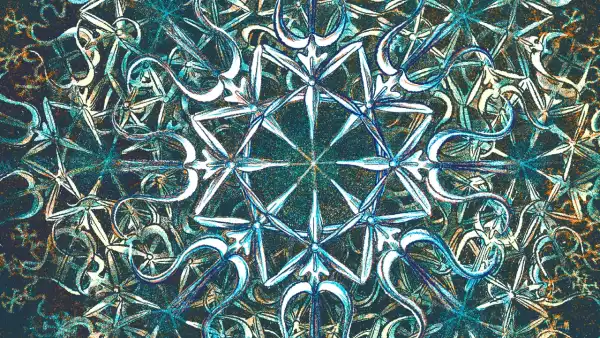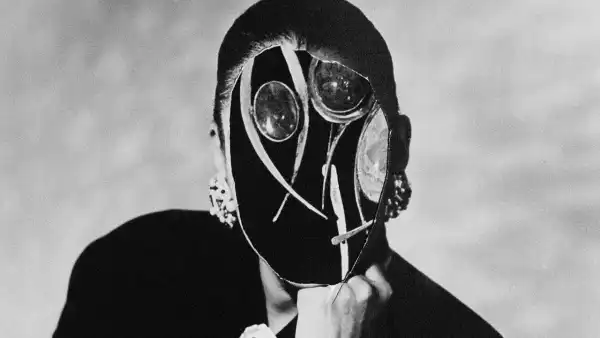
Save this storySave this storySave this storySave this story
Melodrama isn’t central to modern French cinema, because melodrama is rooted in irony, whereas one could hardly slip a playing card between most great French directors’ intentions and results. But, in 1975, a thirtysomething former Cahiers du Cinéma critic, André Téchiné, pressed the wide purview of historical reflection into the exaggerations of romantic passion in a film called “Souvenirs d’en France” (here, “French Provincial”) and found a distinctive melodramatic voice. In his long career—he has directed twenty-five features and is still going—Téchiné’s inspiration has been intermittent but mighty. Few major filmmakers working outside studio-system constraints exhibit such a range between their best work and their lesser efforts. Sometimes Téchiné’s relationship to his subjects proves literal and his direction turns plain to match. Yet, when the tension between his emotion and its expression is palpable—and when he reveals himself as much in style as in substance—his films glow ardently with contained passion.
Appropriately, then, Téchiné’s most enduring collaboration has been with one of the great actors of containment and of style, Catherine Deneuve, who hardly has to do anything to do a tremendous amount and to do it stylishly. They’ve made seven films together, including his masterwork, “My Favorite Season,” from 1993, which screens April 29th in a series at L’Alliance devoted to their joint ventures. “My Favorite Season” was released here in 1996, at a time when many of the best French films failed to get U.S. distribution; despite some good reviews and a DVD release, it has fallen into undeserved oblivion. The screening also offers a welcome opportunity for me to rewatch it—as I’d done several times before its release—because I had a tiny role in its distribution. To make a long story short, when Téchiné and Deneuve came to New York, in January of that year, the distributor of “My Favorite Season” invited me to join them for lunch and discuss Téchiné’s proposal to trim the film for its American release. (I loved the film as it was and said so; he ultimately left it intact.)
Lately, I’ve been thinking about the distinction between story and plot—specifically, between characters’ over-all relationships and the onscreen events through which those relationships are evoked. Often, critical elements in a story are suggested in a glance, a gesture, a line of dialogue—events of infinitesimal scale but large import. In “My Favorite Season,” which Téchiné co-wrote with Pascal Bonitzer (also a Cahiers alumnus and a noteworthy director), the gap between story and plot is thrillingly enormous and paradoxical: the story, easily summarized, advances a solid set of conflicts and resolutions that involve family history brought to the fore, but the plot—the onscreen action—is a disparate constellation of lurches and touches, dramatic nodules and sidebars, and, above all, bruisingly contentious dialogue with a surface formality that’s all the more forcefully expressive because it’s only rarely broken.
The action is set in southwestern France; Deneuve plays Émilie, a lawyer in partnership with her husband, Bruno (Jean-Pierre Bouvier). She invites her younger brother, Antoine (Daniel Auteuil), a neurologist in nearby Toulouse, from whom she’s been estranged for three years, to spend Christmas at the family’s house in the comfortable village where they live. The gathering includes their mother, Berthe (Marthe Villalonga), who has been staying with her daughter unhappily (she has always openly favored Antoine), and the couple’s two college-age children (plus their friend). But Antoine doesn’t get along with his brother-in-law, Bruno, and their conflict prompts Berthe to leave with Antoine and return to her own home. It also sparks trouble between the married couple. Antoine and Émilie, driven apart again, are forced to reunite when Berthe has fainting spells and can no longer live on her own. As Antoine and Émilie attend to their mother’s well-being, their complex and intense relationship reshapes the extended family.
Throughout “My Favorite Season,” the past is present, the intimate life of the family infused with history. Berthe never went to school and is illiterate. Her late husband, a manufacturer and a dealer of agricultural equipment, insisted that his children be educated so that they could have opportunities that he and his wife lacked. He wanted them, Berthe recalls, to be “modern,” and so they are, but she recognizes the price of their modernity: she wishes she had a third child, a less modern one, who’d take her in and care for her. History is built into Téchiné’s visual compositions, his very sense of style. In a crucial sequence, which shows the siblings bringing their mother to a nursing home, a car ride turns into a sentimental journey. Antoine and Émilie sing a song they sang on childhood car trips. Berthe, sitting in the back seat listening, is seen in closeup through a side window as reflections of passing trees flit across her face: fleeting moments fuse with deep memories. The hearty singing continues as the car, seen in a long shot, traverses an expansive verdant landscape that almost seems filled with their song—until the nostalgic reverie is broken by the jarring image of a metal railing, an intimation of the hard and cold present tense of the nursing home, which Téchiné then implacably reveals in a deft prolongation of the shot. Without a word, the images and the moods mark the end of the past: a dramatic, definitive breaking point of the family’s life.
A moving camera is a marker of the passage of time, as in classic films by Max Ophüls, Kenji Mizoguchi, and Alain Resnais. In “My Favorite Season,” Téchiné’s camera is intently active but weightily so. Its movements, mainly lateral, aren’t suave or ornamental but, rather, feel burdened, as if by time itself. There’s none of the impulsive lightness of handheld camerawork; even in fervent motion, the film’s images feel tethered to the ground, deeply rooted in terrain and locale, in physical and intimate histories. After Antoine and Émilie deposit their mother at the nursing home, they have lunch together at an outdoor snack bar. Their chat degenerates into an argument, and Émilie storms off. In a single take, Antoine chases after her—dumping the remains of their meal in a garbage can and catching up with his sister on a nondescript roadside shoulder. From there, Téchiné follows the pair in a long tracking shot that keeps them tensely together as their supercharged memories surge forth amid the banal surroundings. (It’s a thrillingly pungent moment of melodramatic irony that stops just short of derision.) And when the camera stays put, in tense closeups or tight groupings of characters, it feels all the more immutably anchored in place.
The action itself, with its piquant and poignant behavioral idiosyncrasies, teems with loose, whiplash-like ends and opaque but gleaming facets. These are richly imagined characters rather than assemblages of traits correlating with plot as if in a showrunner’s bible. The greatness of the film’s imaginative range emerges early on, when, late at night, Émilie finds Berthe, an unhappy guest, sitting outside in a lawn chair, talking to herself—utterly sanely and self-consciously conjuring both sides of conversations with people who aren’t there. Émilie suggests turning on a light, and her mother responds sardonically: “You’re afraid I’ll break something.” (Villalonga’s quietly pugnacious, rock-hard performance yields a refreshingly unsentimental incarnation of old age.) Much of the dialogue is similarly lacerating: Bruno tells Émilie that Berthe raised her and Antoine badly; Émilie tells Antoine that she wishes he didn’t exist; Antoine charges her with hating their mother and waiting for a chance to vent her hatred. Émilie and Bruno have a quiet but horrific marital showdown while, unbeknownst to them, their daughter (played by Chiara Mastroianni, Deneuve’s real-life daughter, in her first movie role) is just outside the room, hearing it all. Nothing but quick and shocking outbursts of violence can pierce the movie’s surfaces of overheated restraint.
Antoine’s peculiarities perhaps cut deepest, even seemingly superficial ones. A brilliant scientist, he refuses to wear a watch, and at a moment of crisis, running through the streets of Toulouse, he dashes up to a stranger and asks the time. He lives alone, and his solitude seems profound, internalized along with an awareness of his difficulties. Arriving for the Christmas Eve dinner, Antoine locks himself in a bathroom and recites aloud a checklist of courtesies and pleasantries that he needs to remain mindful of—expected displays of interest and fine points of sociability. This is not the only social setting for which he must similarly steel himself.
As for Émilie, Deneuve’s interpretation of the role reminds me of the critical relationship between formality and form. France is a culture of manners, of eloquence, of graceful behavior, as if life itself, from the grandly public to the intimately domestic, were essentially performative, requiring constant self-control. The private face of France is public-facing, intensely self-conscious, the result of an internalized sense of mirroring. The sense of selfhood existing in mirrorlike closeup, is an inherently cinematic one, not a theatrical one, and Deneuve is the greatest exemplar of this French style. The built-in formality of her affect becomes an aspect of film form, seemingly concentrating and tightening the performances of other cast members and even the cinematic frame around her. With her glances, her gestures, her subtle shifts of moods, her very aura, she seemingly shares in the direction of the movies she appears in, and Téchiné, sensitive to the inner turmoil of her marmoreal stillness, reaches his directorial zenith by tuning this film to her. Fusing his compositions to her manner, he paces the movie to her multiple systems of tempo, the simultaneous poised grandeur and febrile agitation. As a result, the movie advances with an innate sense of gravity, of fracturing menace looming beneath the order and charm of modern lives. ♦
Sourse: newyorker.com







